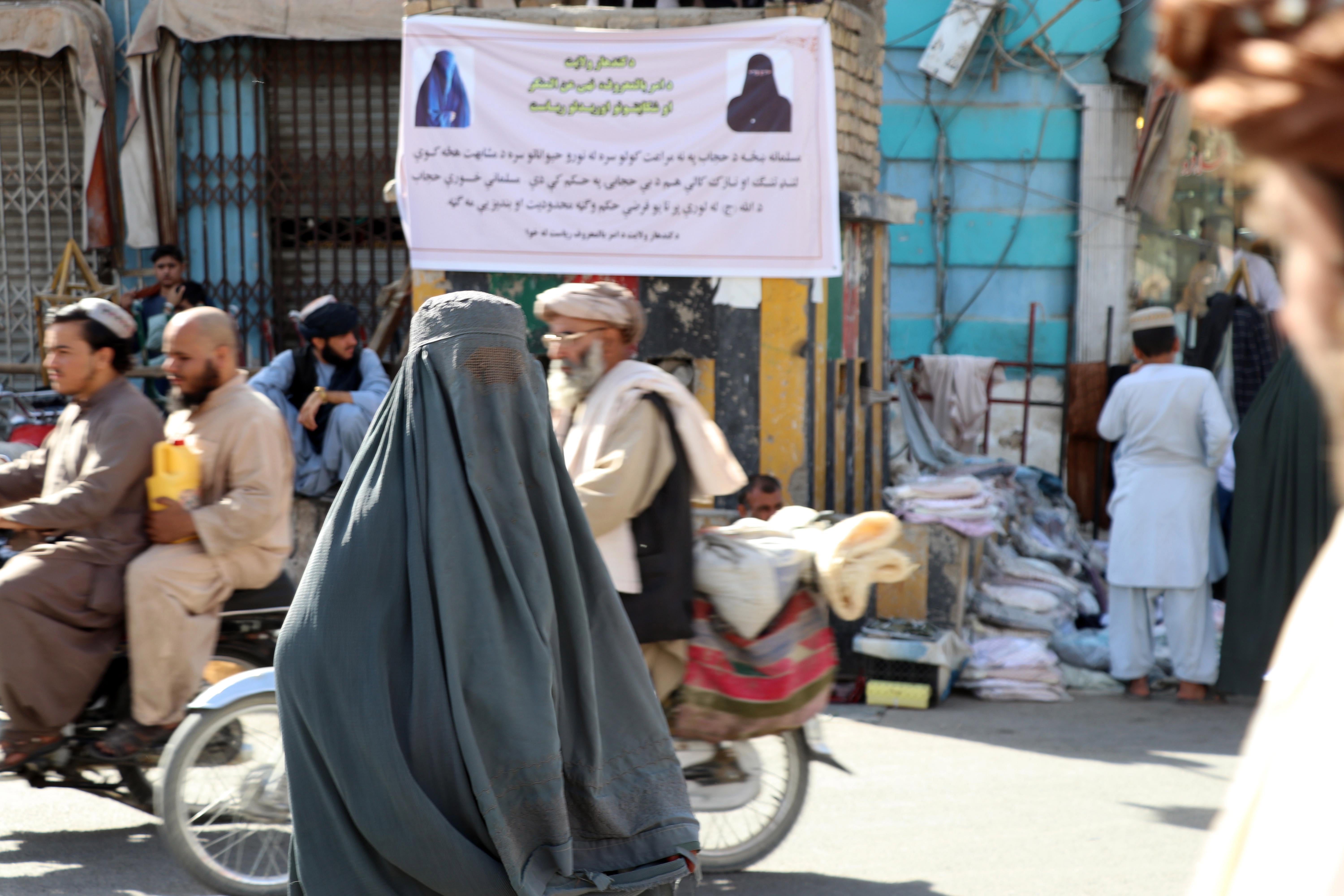A culture of intimidation by men: Afghanistan is unravelling under the Taliban
The Taliban’s rise has inspired an ugly misogynistic spirit among certain segments of Afghan society, writes Borzou Daragahi


She is a midwife in a rural district of Afghanistan, and by the 25-year-old’s own estimate, she must have already delivered about 1,000 babies in her short career. But since the Taliban takeover of Afghanistan last year, Rana (not her real name) has faced nothing but mounting uphill struggles in pursuing her work.
First, her father fell ill with Covid, making her the family’s sole breadwinner. Then local Taliban commanders began ordering her not to leave the house without a mahram – a male parent or brother to chaperone her. Afghanistan’s changing circumstances threatened both her important work and her family’s wellbeing.
Rana’s story is one measure of the tremendously damaging impact of the cataclysmic collapse of the Kabul government last summer, and how much more complicated delivering aid to Afghans in dire need has become.
Since the Taliban takeover, Afghanistan’s isolation has only deepened. Many aid organisations have reduced staff or relocated altogether. Not a single nation has yet recognised the Kabul government. Western nations have frozen funds earmarked for Afghanistan. They are outraged by the Taliban’s continued barring of girls above 12 years of age from school, as well as the Islamic Emirate of Afghanistan’s exclusion of ethnic and religious minorities from high levels of power.
“We are very disturbed by what we see as a consistent negative trajectory of women’s rights and human rights in Afghanistan,” Rina Amiri, the United States special envoy for Afghan women, told reporters in a briefing last week. “There is diminishing confidence that the Taliban is going to turn things around.”
Even as security has improved, the country’s economy has taken a dramatic downturn. Hunger is rising, and those with means and skills continue to flee abroad.
That makes what Rana does so crucial. Even while pregnant, young women are often struggling with hunger and malnutrition, suffering under the thumb of mothers-in-law who denigrate them and husbands who see them as little more than incubators for their offspring. In a statement shared with The Independent, Rana described encountering numerous complicated teenage pregnancies, including girls of 16 or 17 pregnant with their second or third child. She struggled to explain to elders why it was dangerous to let children have children, often bolstering health advice with references to Islamic scripture.
“They don’t know that women and children have rights,” she said in her statement. “So I realised that there was a way for me to share what I know with them about health, from the angle of our religion.”
Midwives are often the first and perhaps sole medical professional the young women are able to see. “It’s really important that our female staff are allowed to go into rural parts of Afghanistan, because it’s the only healthcare any of the women there have access to,” Kirsty Cameron, spokesperson for the charity Intersos, which is among the international organisations that provide health services to Afghan women, says in an interview. “We work in some of the most remote parts of the country and we would never even find out about the women we are supporting unless our midwives were able to reach them.”
Even by the Taliban’s strict rules, Rana’s profession is considered vital. And under national rules, they should allow her to go out and work. But the Taliban’s rise has inspired an ugly misogynistic spirit among certain segments of Afghan society. And men sometimes throw their weight around by demanding women have a male chaperone.
“At the national level there isn’t yet implementation of the mahram, but it’s increasingly taking place and it is a hindrance,” said Amiri. “The Taliban has created a culture of intimidation by men across society.”
After local authorities ordered Rana to only travel with a male guardian, she was in trouble. All her brothers attend university and could not accompany her. Her father had barely survived an awful case of Covid, and was unable to either accompany her or go to work himself.
International aid organisations intervened on her behalf, pleading with local authorities to let her continue attending to pregnant women and their newborn babies. They ultimately agreed. Rana continues to do her vital work.
To keep up to speed with all the latest opinions and comment, sign up to our free weekly Voices Dispatches newsletter by clicking here
This week, the Taliban convened a summit in Kabul in what many hoped would be an attempt to make a U-turn on matters such as girls’ education and women’s health. Perhaps the ongoing meeting of elders and religious scholars from across Afghanistan’s 34 provinces and 421 districts is also an attempt to show a unified front in the face of Western pressure. Others say the meeting may be aimed more at pressuring local authorities into accepting national rules, rather than acting autonomously.
The opening of the gathering coincided with heavy gunfire and explosions in Kabul, allegedly at the hands of rebel fighters opposed to the Taliban’s rule in what may be a harbinger of the chaos to come.
Regardless of the outcome of the conference, the status quo in Afghanistan is not working and the country is quickly unravelling. More than 60 per cent of Afghanistan’s 39 million people are in need of humanitarian assistance and half are going hungry. Unemployment is rampant, and global food prices are rising. Meanwhile, international attention has drifted toward the war in Ukraine. Something in Afghanistan needs to change before the country reaches an even more dramatic and darker breaking point.






Join our commenting forum
Join thought-provoking conversations, follow other Independent readers and see their replies
Comments